Alberta
Saskatchewan Premier Scott Moe is leading the fight against our own federal government to save Canada
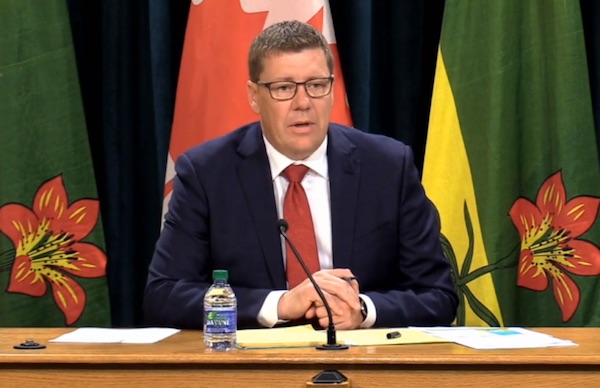
Article submitted by Josh Andrus of Project Confederation
A lot of media attention of late has been focused on the Emergencies Act testimonies in Ottawa and Danielle Smith’s rise to the Premier’s Office here in Alberta.
However, the biggest development in federal/provincial politics in the last week might actually have happened in Saskatchewan, where Premier Scott Moe has taken a firm stance against the federal government in a document entitled Drawing the Line: Defending Saskatchewan’s Economic Autonomy.
The paper clearly sets out a problem and then proposes specific solutions.
First, the problem…
The Saskatchewan government has identified nine different federal climate change policies that are estimated to cost the province a total of $111 billion between 2022 and 2035 – the approximate halfway point to the federal government’s 2050 net-zero targets.
The costs of each of the nine policies are:
- Federal Carbon Tax: $24.7 billion;
- Oil and Gas Methane Mandate: $6.3 billion;
- Oil and Gas Emissions Cap: $2.6 billion;
- Fertilizer Mandate: $19.3 billion;
- Clean Fuel Regulations: $34.9 billion;
- Zero Emission Vehicle Mandate: $10.3 billion;
- Federal Output Based Pricing System: $12.5 billion;
- Agriculture Methane Initiatives: $0.5 billion;
- Landfill Methane Mandate: $0.2 billion.
Don’t forget – these are just the direct costs.
We all know that the energy industry powers every other industry and, since energy is required to create almost every other product, as energy prices increase, costs for consumer goods will undoubtedly rise across the board as well.
Scott Moe and his team have a clear understanding of the problem and are deeply concerned about the impacts federal environmental policy can have on the economy.
For a province like Saskatchewan, where total provincial revenue for 2022 was just $17.2 billion, $111 billion is a gigantic cost.
And if that’s the cost to our neighbours, imagine what it will cost here in Alberta!
Remember too, this is just the first half of the federal government’s 2050 plan!
The economic costs of Net Zero 2050 are completely lost on the Trudeau government.
The 2021 Supreme Court of Canada ruling on the constitutionality of the Carbon Tax, as we noted at the time, creates a dangerous precedent where the federal government can essentially trample all over the constitutional jurisdiction of provinces using the Peace, Order, and Good Governance Clause embedded in the constitution.
This means that the Supreme Court has effectively ruled that the federal government can take control of practically any issue, simply by claiming that it is a matter of national concern – completely ignoring provincial jurisdiction.
Consider that the definition of Confederation, as espoused by the Oxford English Dictionary, is a union of sovereign groups or states united for purposes of common action.
Instead, what we now have is a federal government that has decided, upon the alter of climate change, to sacrifice our livelihoods and, with them, the very idea of Canada itself.
If we want to save this country, we need substantial reforms to the way this country is governed.
Thankfully, the Saskatchewan government’s paper also proposes some solutions that include:
- Provincial legislation to clarify and protect constitutional rights belonging to the province.
- Pursuing greater autonomy over immigration policy to ensure Saskatchewan has the people it needs.
- Better recognition of Saskatchewan industry’s contributions to sustainable growth – for example, developing a carbon credit market to support our natural resource industries.
- Preparing to take legal actions, legislative or otherwise, to maintain control of electricity, fertilizer emission/use targets and oil and gas emissions/production.
Here at Project Confederation, we’re very supportive of these ideas – in fact, many of them are ideas we’ve been promoting not just for Alberta, but for all of the west, since we launched as an organization.
So, props to Scott Moe and the Saskatchewan government for pushing us down the right path.
With your continued support, we can’t help but be excited about what we are capable of as we move forward.
Having seen significant success in Alberta already, we will be expanding our work all across Saskatchewan and the other western provinces in the coming months, as we take on Ottawa and prepare for the onslaught of a hostile federal government over the next few years.
If you’d like to get involved in our campaigns, you can sign up to volunteer with us here.
We also need financial support to continue with our work.
If you can afford to help fund our important work, please click here to make a contribution:
Thank you again to everyone for their help with this campaign and we look forward to working with you on many more issues in the future.
Regards,
Josh Andrus
Executive Director
Project Confederation
Alberta
It’s On! Alberta Challenging Liberals Unconstitutional and Destructive Net-Zero Legislation

“If Ottawa had it’s way Albertans would be left to freeze in the dark”
The ineffective federal net-zero electricity regulations will not reduce emissions or benefit Albertans but will increase costs and lead to supply shortages.
The risk of power outages during a hot summer or the depths of harsh winter cold snaps, are not unrealistic outcomes if these regulations are implemented. According to the Alberta Electric System Operator’s analysis, the regulations in question would make Alberta’s electricity system more than 100 times less reliable than the province’s supply adequacy standard. Albertans expect their electricity to remain affordable and reliable, but implementation of these regulations could increase costs by a staggering 35 per cent.
Canada’s constitution is clear. Provinces have exclusive jurisdiction over the development, conservation and management of sites and facilities in the province for the generation and production of electrical energy. That is why Alberta’s government is referring the constitutionality of the federal government’s recent net-zero electricity regulations to the Court of Appeal of Alberta.
“The federal government refused to work collaboratively or listen to Canadians while developing these regulations. The results are ineffective, unachievable and irresponsible, and place Albertans’ livelihoods – and more importantly, lives – at significant risk. Our government will not accept unconstitutional net-zero regulations that leave Albertans vulnerable to blackouts in the middle of summer and winter when they need electricity the most.”
“The introduction of the Clean Electricity Regulations in Alberta by the federal government is another example of dangerous federal overreach. These regulations will create unpredictable power outages in the months when Albertans need reliable energy the most. They will also cause power prices to soar in Alberta, which will hit our vulnerable the hardest.”
Finalized in December 2024, the federal electricity regulations impose strict carbon limits on fossil fuel power, in an attempt to force a net-zero grid, an unachievable target given current technology and infrastructure. The reliance on unproven technologies makes it almost impossible to operate natural gas plants without costly upgrades, threatening investment, grid reliability, and Alberta’s energy security.
“Ottawa’s electricity regulations will leave Albertans in the dark. They aren’t about reducing emissions – they are unconstitutional, ideological activist policies based on standards that can’t be met and technology that doesn’t exist. It will drive away investment and punish businesses, provinces and families for using natural gas for reliable, dispatchable power. We will not put families at risk from safety and affordability impacts – rationing power during the coldest days of the year – and we will continue to stand up for Albertans.”
“Albertans depend on electricity to provide for their families, power their businesses and pursue their dreams. The federal government’s Clean Electricity Regulations threaten both the affordability and reliability of our power grid, and we will not stand by as these regulations put the well-being of Albertans at risk.”
Related information
- Conference Board of Canada socio-economic Impacts of Canada’s 2030 Emissions Reduction Plan – (April 2025)
- Alberta Electric System Operator’s position on Canadian Energy Regulations
Alberta
Alberta’s future in Canada depends on Carney’s greatest fear: Trump or Climate Change
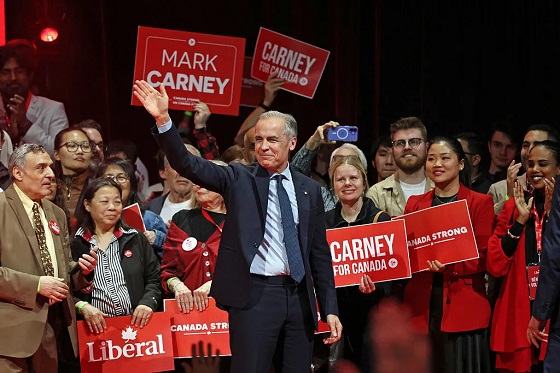
Oh, Canada
We find it endlessly fascinating that most Canadians believe they live in a representative democracy, where aspiring candidates engage in authentic politicking to earn their place in office. So accustomed are Canada’s power brokers to getting their way, they rarely bother to cover their tracks. A careful reading of the notoriously pliant Canadian press makes anticipating future events in the country surprisingly straightforward.
Back in December, when Pierre Poilievre was given better than 90% odds of replacing Prime Minister Justin Trudeau—and Mark Carney was still just an uncharismatic banker few had heard of—we engaged in some not-so-speculative dot-connecting and correctly predicted Carney’s rise to the top spot. Our interest was driven by the notoriously rocky relationship between Ottawa and the Province of Alberta, home to one of the world’s largest hydrocarbon reserves, and how Carney’s rise might be a catalyst for resetting Canada’s energy trajectory. In a follow-up article titled “The Fix Is In,” we laid out a few more predictions:
“Here’s how the play is likely to unfold in the weeks and months ahead: Carney will be elected Prime Minister on April 28 by a comfortable margin; [Alberta Premier Danielle] Smith will trigger a constitutional crisis, providing cover for Carney to strike a grand bargain that finally resolves longstanding tensions between the provinces and Ottawa; and large infrastructure permitting reform will fall into place. Protests against these developments will be surprisingly muted, and those who do take to the streets will be largely ignored by the media. The entire effort will be wrapped in a thicket of patriotism, with Trump portrayed as a threat even greater than climate change itself. References to carbon emissions will slowly fade…
In parallel, we expect Trump and Carney to swiftly strike a favorable deal on tariffs, padding the latter’s bona fides just as his political capital will be most needed.”
The votes have barely been counted, yet the next moves are already unfolding…
“Alberta Premier Danielle Smith says she’ll make it easier for citizens to initiate a referendum on the province’s future in Canada, after warning that a Liberal win in Monday’s election could spur a groundswell of support for Alberta separatism. Smith said on Tuesday that a newly tabled elections bill will give everyday Albertans a bigger say in the province’s affairs.
‘(We’re giving) Albertans more ways to be directly involved in democracy, and to have their say on issues that matter to them,’ Smith told reporters in Edmonton.
If passed, the new law would dramatically lower the number of signatures needed to put a citizen-proposed constitutional referendum question on the ballot, setting a new threshold of 10 per cent of general election turnout — or just over 175,000, based on Alberta’s last provincial election in 2023.”
“US President Donald Trump said on Wednesday that Canadian Prime Minister Mark Carney is looking to make a trade deal and will visit the White House within the next week. Trump said he congratulated Carney on his election victory when the Canadian leader called on Tuesday.
‘He called me up yesterday – he said let’s make a deal,’ Trump told reporters at the White House after a televised Cabinet meeting.”
Remember where you read it first.
-
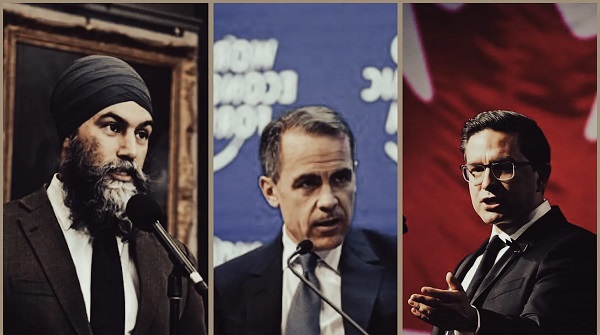
 2025 Federal Election1 day ago
2025 Federal Election1 day agoNDP Floor Crossers May Give Carney A Majority
-
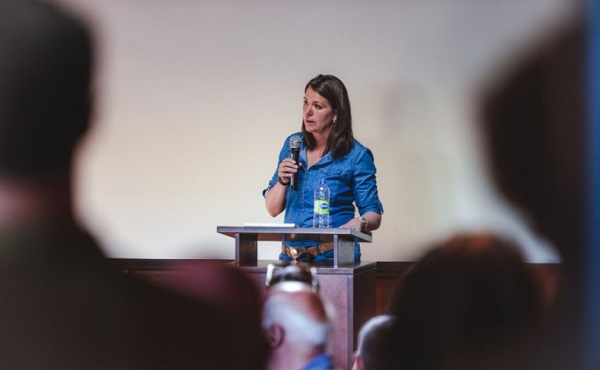
 Alberta2 days ago
Alberta2 days agoPremier Danielle Smith hints Alberta may begin ‘path’ toward greater autonomy after Mark Carney’s win
-

 Business23 hours ago
Business23 hours agoChina’s economy takes a hit as factories experience sharp decline in orders following Trump tariffs
-

 Alberta5 hours ago
Alberta5 hours agoIt’s On! Alberta Challenging Liberals Unconstitutional and Destructive Net-Zero Legislation
-

 Automotive1 day ago
Automotive1 day agoNew federal government should pull the plug on Canada’s EV revolution
-

 Business1 day ago
Business1 day agoScott Bessent says U.S., Ukraine “ready to sign” rare earths deal
-

 Mental Health1 day ago
Mental Health1 day agoHeadline that reads ‘Ontario must pay for surgery to give trans resident both penis and vagina: appeal court’ a sign of the times in Canada
-
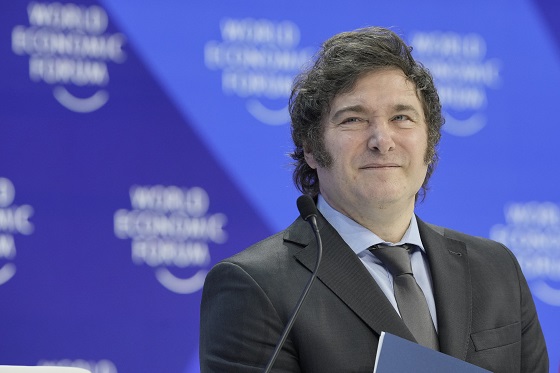
 International23 hours ago
International23 hours agoJavier Millei declassifies 1850+ files on Nazi leaders in Argentina





